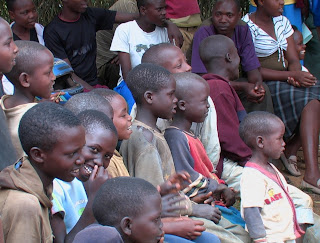Every morning as I leave my house and begin the twenty-minute walk to the Millennium Village office, I am immediately greeted with a loud chorus of "mzungu!!!" that follows me non-stop for the rest of the walk. Until I reach the main paved road that runs from Kigali, these cries come mainly from very small children.
I am thoroughly convinced that the first word you learn as a baby in East Africa is mzungu, the Swahili word for white person. It usually takes me all of about ten seconds to gather a small parade of children, most of them trying to hold my hand, rub my skin to see if the color will come off, or play with the forest of blonde hair growing on my arms.
Often, I am greeted with "give me money," "how are you?", "give me water", or "good morning", which is especially peculiar when said over and over as the sun is setting on my way home (here in francophone Rwanda, an interesting mix of "bonjour" and "comment ca va?" enters the equation). I am almost positive that not a single one of these children actually wants or expects water and money, but rather to satisfy themselves and impress their friends with the ability to speak English to a white person.
The best is when one of these phrases, almost always "mzungu" or "how are you?", grows slowly into a rhythmic chant that is well rehearsed and has specific choreography, namely jumping up and down and flailing one's arms around as much as possible. As soon as this chant starts to materialize, kids come out of nowhere to join in, as parents look on with amusement or glance up for only a moment before continuing their work. Often, a kid will face plant while trying to outdo his/her buddy then miraculously spring right back up and join back in as if nothing has happened.
This all may sound very cute and endearing. For the first week or so, it certainly can be. However, after awhile, I choose to either ignore these pursuits or answer their questions in their own language with "ni meza" (I am fine) or "muraho" (Hello).
By the way, speaking Kinyarwanda as a white person always gets a reaction, no matter how many words are spoken or to what age group. The most common reaction is to laugh and chatter to a friend or group of friends while pointing at me. Sometimes the person will answer normally, then do a double take and realize it's a white person talking, often leading to uncontrollable giggling or running away, or both.
Somewhere in the back of my mind, it bothers me a lot that a single word of their language uttered from the mouth of a mzungu is somehow an act of God, while they are expected to speak four languages by the time they graduate high school. The "African Studies major" part of my brain dives into the inevitable and inexhaustible questions about how we developed a global system where disparities such as this could exist, and what, if anything can be done about them (or for that matter, should or should not be done about them).
Turning on to the main road brings its own fun times. First of all, let me try to describe to you the phenomenon of being stared at by literally everyone. Imagine a time you have been in a crowded place and done something that drew attention to yourself, such as blow an air horn, trip flat on your face, or accidentally yell "BANG!!"
Try and access that feeling of being completely exposed for that single moment when every eye is on you, curious as to what caused the disruption.
Now imagine that happening ALL THE TIME.
Anytime I am in public in rural East Africa, every single eye, without exception, is locked on me. If I choose to look at anyone, they are, without a single doubt, already looking at me. Granted, the feeling I described gets less intense as time wears on, but I do not believe it is possible for it to go away completely.
Then there are the hagglers, and all of those people running local businesses on the side of the road who desperately want the money--money that is surely flowing out of your white body faster than you can keep it in--to land in their hands in exchange for their bananas, phone cards, rides on backs of bicycles, tacky calendars full of smiling white babies, inspirational posters, or knock-off Gucci sunglasses (a pair of which I admittedly bought from a street hawker in Nairobi once, then lost in a drunken float trip down the Illinois River at the end of my senior year of college).
Or, they have no legs and want money to buy food, alcohol or drugs. Or they are scrawny street kids who beg for money to bring across the street to the man they work for.
To be fair, this specific kind of solicitation has only happened in Rwanda a few times thus far.
This, my friends, is the definition of culture shock. Some days are worse than others. Sometimes I actually stop and attempt to carry on conversations with people using the ten Kinywaranda words I know, or in broken Swahili. And sometimes I look straight ahead, walking as quickly as my long, gangly legs will take me.
The best method of dealing with these feelings is to acknowledge that they will never go away, and that it's okay to feel frustrated sometimes with the realization that no matter how hard I try, my tall, white, lanky, goofy, big-toothed mzungu self will never ever completely fit in :)

















